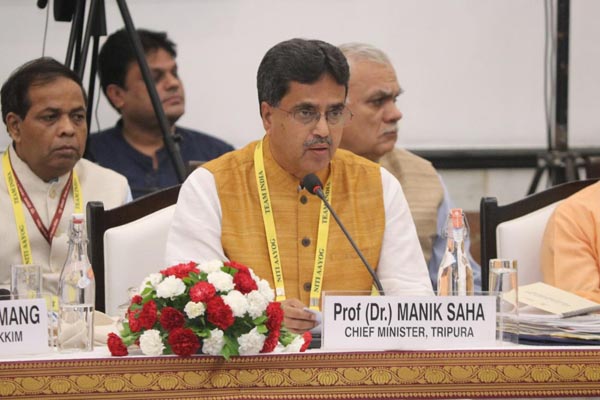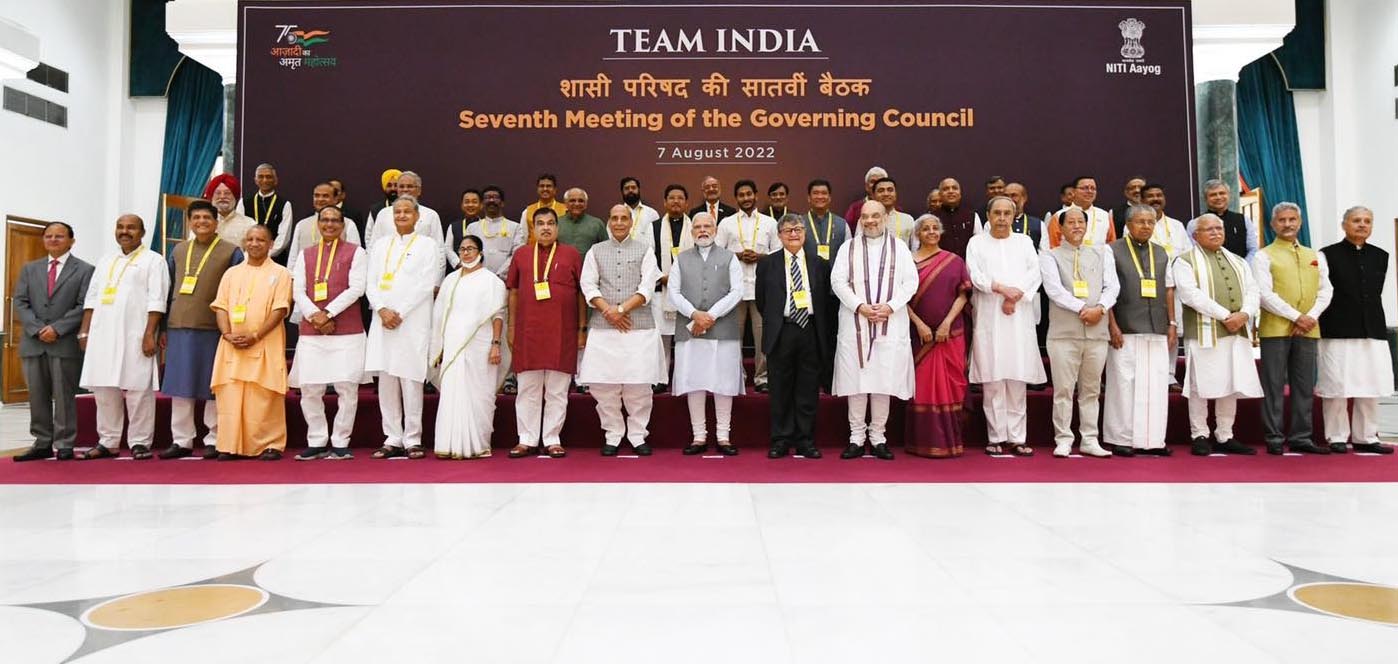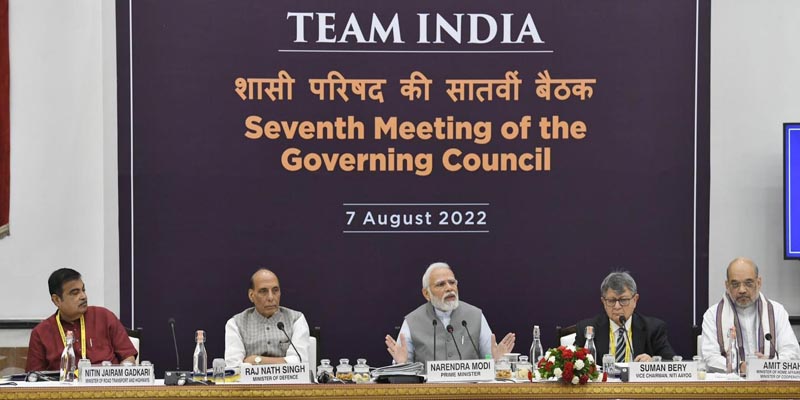Agartala, Aug 07, 2022, TRIPURATIMES Desk
Highlights from Chief Minister Dr, Manik Saha’s speech in the NITI Aayog’s governing council meet:
GIS-based Property Tax System ready to be launched, Smart Class in 812 Schools and Digital Libraries in 304 schools to be introduced, Master Planning for 20 ULBs to be published in June 2023, Universities in state planning to introduce Choice Based Credit System, Drone Technology Centre to come up in TIT.
 Agartala, Aug 07: Tripura Chief Minister Dr. Manik Saha, who attended the 7th meeting of the Governing Council of NITI Aayog in New Delhi on Sunday, said the state government has taken a three-year plan to bring diversification in 50,000 ha land with Maize and Blackgram cultivation.
Agartala, Aug 07: Tripura Chief Minister Dr. Manik Saha, who attended the 7th meeting of the Governing Council of NITI Aayog in New Delhi on Sunday, said the state government has taken a three-year plan to bring diversification in 50,000 ha land with Maize and Blackgram cultivation.
He said, for providing food safety, nutritional security, improving soil health and socio-economic status of the farmers, the State Government has taken a three-year Plan (2020-21 to 2022-23) to bring diversification in 50,000 ha land with Maize and Blackgram cultivation.
Prime Minister Narendra Modi chaired the NITI Aayog’s Meeting at Cultural Centre of Rastrapati Bhavan in New Delhi where the Tripura Chief Minister presented the best practices and plans from the state.
Highlighting the key initiatives in the Agriculture sector, the Tripura Chief Minister said, a state-level Steering Committee and an Implementation Committee have already been constituted and both the committees already held the first meetings.
“State has finalized Standard Operating Procedure for creation of farmer's database. Land Records & Settlement department working on API of land record database for dynamic linking. Land record department has already initiated Geo-referencing of all villages. All the farmers will be connected in a digital platform with a unique farmer's ID which will facilitate in providing all the farmers' centric services through digital mode,” the Chief Minister mentioned in his speech.
Quality seed from NSC and other inputs were provided to the farmers and assistance of Rs. 6,000/ha for Hybrid Maize and Rs. 9,000/ha for Blackgram was extended from schemes like RKVY and NFSM. Besides, emphasis has been given on adoption of newly released hybrid and high yielding varieties, cluster cultivation, extending irrigation facilities, mechanization and processing support, capacity building of the farmers, the Chief Minister said in the meeting.
He also briefed about the strategies for Atma Nirbhar Krishi, self-sufficiency in Pulses, Oilseeds and other Agri Commodities.
At present, total area under Pulses in the State is 23,732 ha. State can fulfil only 24 percent of its requirement of pulses. Total area under Oilseeds in the State is 15,165 ha. and the state can fulfil only 10 percent of its requirement of Oilseeds.
Under the National Mission on Edible Oil - Palm Oil, the State has taken target to cultivate Oil-Palm in 530 ha area during 2022-23. A MoU with GOI for Viability Gap Payment for farmers has already been signed. For increasing production and productivity of Pulses and Oilseed crops, efforts like adoption of hybrid and high yielding seeds, increase in varietal replacement rate, efficient fertilizer use, reclamation and deficiency correction of soil, promotion of micro-irrigation, cluster cultivation, establishment of Custom Hiring Centres, credit support have been planned.
Briefing on urban governance, the Chief Minister said, a GIS-based Property Tax system is ready for launch in Tripura’s municipal areas and the new system would be introduced from the Financial Year 2023-24 and it would increase Municipal Revenue by at least 20 per cent.
He said, “Master Planning for 20 Urban Local Bodies is in advanced stage and shall be finally published in June 2023. We have established Tripura Urban Planning and Development Authority for proper Urban Planning and development of infrastructure in more than 500 Sq KMs.”
The Chief Minister also informed the meeting that the state has an e-Municipality Module for online delivery of services and permissions.
State Government is providing insurance cover of maximum Rs. 3 lakhs for small and marginal shops keepers of urban areas against fire and burglary for which Government is providing Rs. 1000 per shopkeeper as first premium. For better management of water and sewerage services, Tripura Jal Board has started functioning from 1st April, this year.
Besides, the state government has devolved 17 out of 18 Municipal Functions on the Urban Local Bodies except Fire Services as the size of towns are small and not able to manage fire services independently.
 Dr. Saha also elaborated the state government’s key initiatives for improving the education system.
Dr. Saha also elaborated the state government’s key initiatives for improving the education system.
He said, the state government is improving access to School Education. After the formation of the present Government in 2018, the Education system has been oriented towards holistic development of children with special emphasis on quality, access and inclusivity to equip all children with 21st Century skills.
This paradigm shift in Education is evidently reflected in the Performance Grading Index (PGI) of the State from Category V in 2017-18 to the coveted group of Grade-I by 2019-20.
In the State, the highest dropout rate is in Secondary education level (26.69%) whereas for Primary and Upper-Primary level such rate is 4.21% and 5.49% respectively. The State has launched 'Vidyalaya Chalo Abhiyan' to identify, arrest dropouts and bring them back to Schools by August, 2022.
Besides, a new project- Saksham Tripura has been launched for the comprehensive academic enrichment of Divyang students by providing special educators in a cluster based approach in 4-5 schools, the Chief Minister added.
Under PM POSHAN, as per NEP mandate of providing morning nutrition, the Tripura government has introduced the same in the Aspirational District of Dhalai. All background work for successful implementation of NIPUN Bharat has been taken by the State; 90' per cent primary teachers have been trained in NISHTA 3.0 in foundational literacy and Numeracy in face to face mode, School readiness module Vidya Setu has been prepared.
Tripura government also launched its most ambitious project named "Mission 100 Vidyajyoti Schools" for transforming 100 existing schools into modern schools with 'state-of-the-art' facilities.
The state government has set a target to invest Rs. 500 crore in "Mission 100 Vidyajyoti Schools" in next three years for development of infrastructure; creation of hostel facilities; recruitment of high quality teachers with in-service training; and to ensure seamless integration of arts and sports with academic curriculum.
The other major Initiatives of State since 2018, which prepared the base for successful Implementation of NEP included adoption of NCERT Curriculum (For Class I-XII), Revamping of Pre- Primary Education with curriculum, workbooks and teacher training (118 Schools), introduction of Vocational Education in 135 Schools in areas of IT-ITeS, Electronics and Hardware, Agriculture and Retail.
ICT Projects have been set up in 365 Schools; another 553 Schools are in the pipeline for introduction. Tinkering Labs have been set up in 90 Schools; another 50 Schools are in the pipeline for introduction.
Super-30 scheme has been introduced to facilitate 30 meritorious Class X Board Examination passed students (belonging to Govt and Govt.-aided schools) to prepare themselves for Engineering and Medical entrance examination.
Besides, Smart Classes would be set up in 812 Schools shortly and for the first time in state, Digital Libraries would be set up in 304 Schools shortly, the Chief Minister said.
He said, 21 out of 22 General Degree Colleges have already been accredited by NAAC, Tripura University has already been registered for Academic Bank of Credits (ABC) and M.B.B University is in process of registration.
 Highlighting the future plans in Higher Education, the Chief Minister said, universities are taking steps to introduce Choice Based Credit System (CBCS) for all the Higher Education Institutions to provide students with freedom in acquiring degrees across the institutions in the country.
Highlighting the future plans in Higher Education, the Chief Minister said, universities are taking steps to introduce Choice Based Credit System (CBCS) for all the Higher Education Institutions to provide students with freedom in acquiring degrees across the institutions in the country.
Curriculum and Syllabi of the subjects offered in General Degree Colleges are being reframed to incorporate Multidisciplinary approach to take care of employability prospects, irrespective of combination of subject at UG or PG level.
The State University and Central University have plans to introduce 4-year degree programme with multiple entry/exit options in all Degree Colleges. Multidisciplinary program would be started in all colleges from 2022-23. The state has introduced skill development programmes like Web developer, Yoga Instructor, Mushroom Grower, Beauty Therapists etc in 9 Degrees to make graduating students employable.
A National Law University is being set up for providing quality law education in the State. The State legislature has already passed the Act. A Drone Technology Centre is being opened at a cost of Rs 5 crore in Tripura Institute of Technology for promoting the use of drone.
Tripura University has set up an Incubation Centre where two incubation projects of MSME have been initiated by two groups which would benefit the students. The State Engineering College is developing an innovation centre with the funding of Department of Information Technology, Tripura for facilitating the aspirant IT innovators for undertaking their innovative projects. The State Government has made free education for girl students upto PG level to encourage girl students to pursue Higher Education. Scholarships for Girl Students are being provided. The Tripura government is targeting to ensure 30 per cent of GER by 2030, the Chief Minister said.